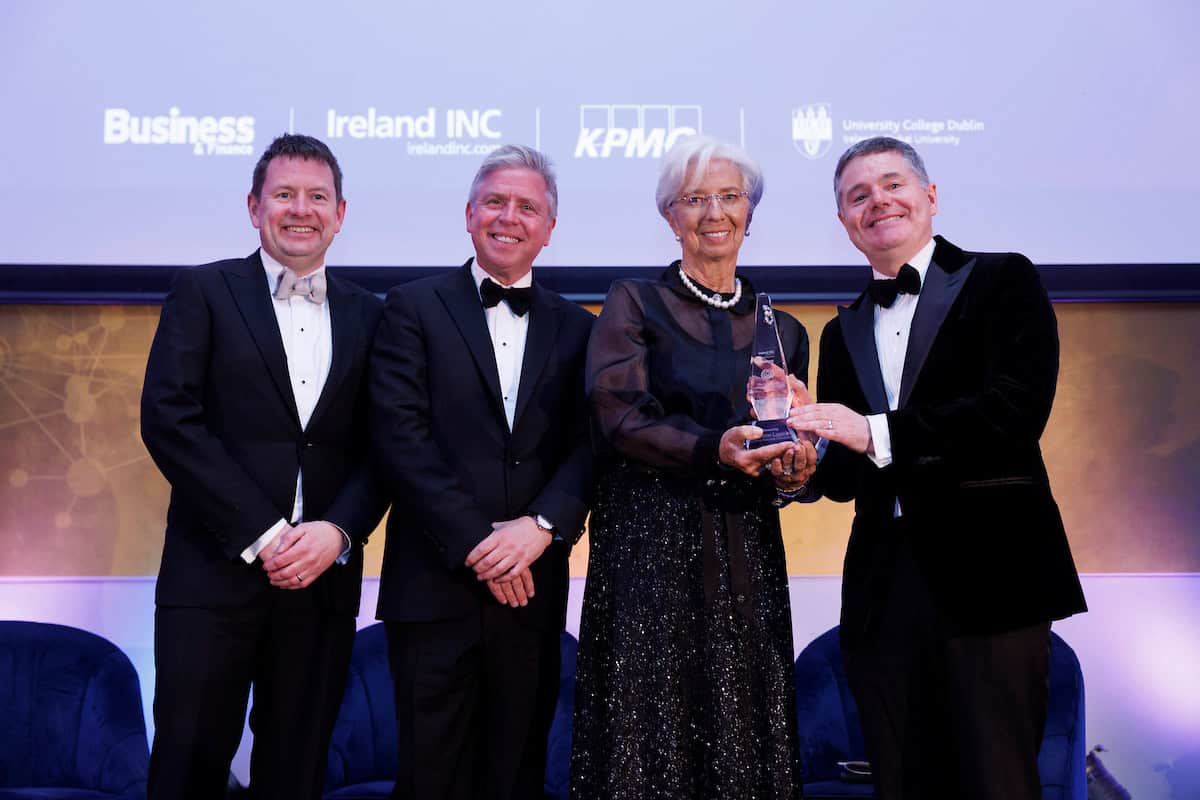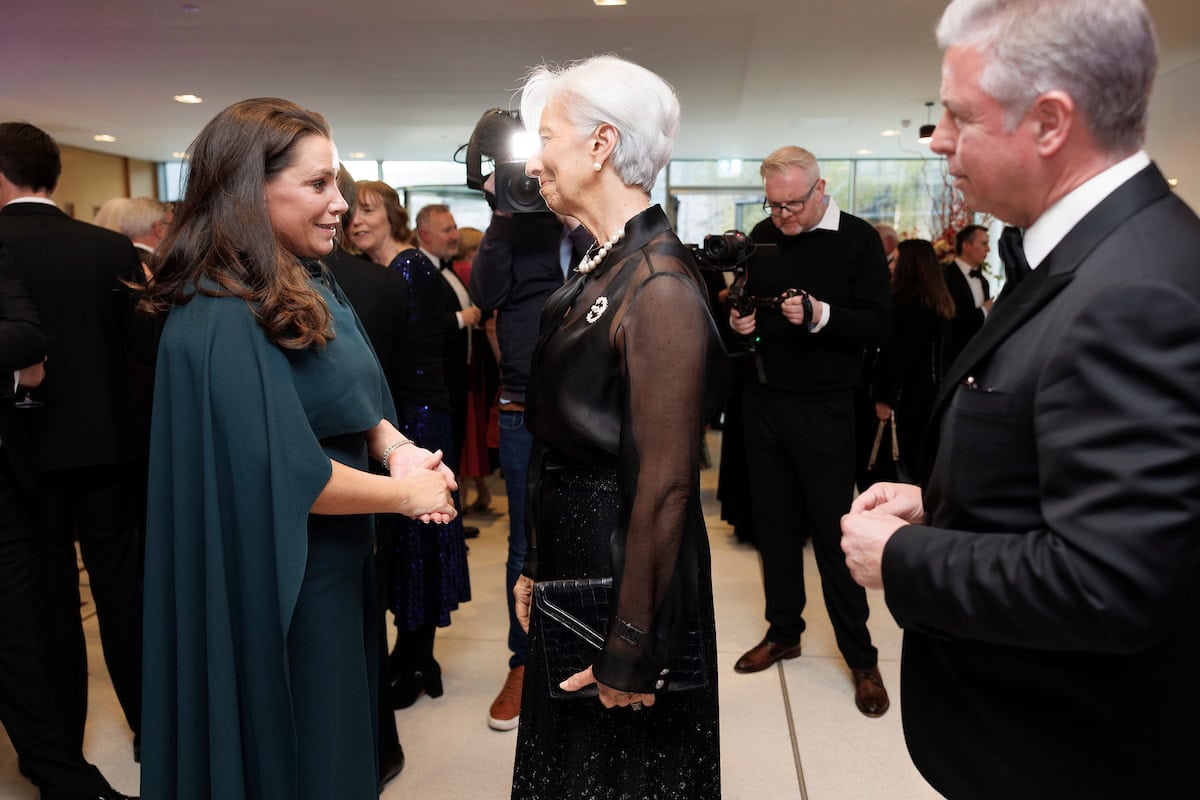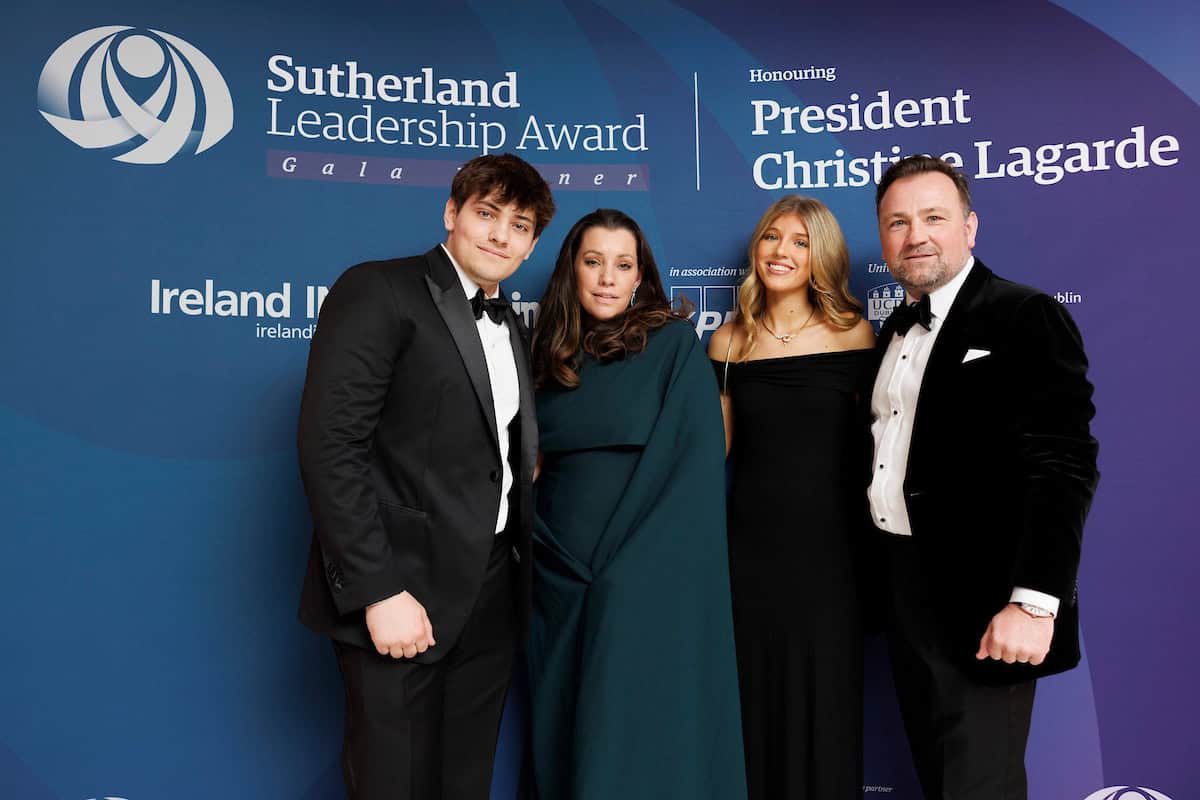Pictured (l-r): Seamus Hand, Managing Partner, KPMG Ireland; Ian Hyland, President and founder of Ireland INC; Christine Lagarde, President of the European Central Bank and Paschal Donohoe, Minister for Finance.
Christine Lagarde, President of the European Central Bank, received the coveted Sutherland Leadership Award yesterday, Wednesday, 2nd April, 2025 at a special Gala Dinner at O’Reilly Hall, UCD Dublin in the company of over 600 international business, political and social leaders.
Christine Lagarde, President of the European Central Bank, was presented with the Sutherland Leadership Award at a special Ireland INC gala dinner in O’Reilly Hall, University College Dublin for her values of collaboration, progress, and positive change. The event was hosted in partnership with KPMG Ireland and venue host and university partner UCD. Sarah Freeman, Managing Editor of Business & Finance, acted as master of ceremonies.
Leaders with legacies
Ian Hyland, President and Publisher of Business & Finance and President of Ireland INC, opened proceedings by highlighting Business & Finance’s “legacy of celebrating outstanding leadership and, indeed, leaders with legacies.”
Over the last 5 decades, Business & Finance has recognised leaders such as US President Bill Clinton, Senator George Mitchell, President Mary McAleese, President Mary Robinson, Kofi Annan, Enda Kenny, Ursula von der Leyen, Speaker Emerita Nancy Pelosi and President Volodymyr Zelenskyy, to name but a few.
“Tonight,” Hyland continued, “I am delighted we continue that legacy in recognising one of the most formative and outstanding leaders of any generation, Christine Lagarde.”
Hyland thanked Seamus Hand and the team across KPMG, for their partnership over two decades, Peter Power and the team at UNICEF, the Business & Finance partner for good, and President of UCD Orla Feely, Triona McCormack, and all the team at UCD for hosting the ceremony on campus.
Hyland also acknowledged key partners to the programme: Ibec, led by CEO Danny McCoy, Enterprise Ireland, led by interim CEO Kevin Sherry, and IDA Ireland, led by CEO Michael Lohan.
Hyland finished the speech by gesturing to geopolitical uncertaintly. “So tonight, we celebrate the leadership that helps us weather the storm and the businesses, political leaders, and decision makers who form the fabric of unity that we know will see us through. Welcome to a very special occasion and enjoy your evening.”
Quoting poet Seamus Heaney, he closed: “If we can winter this one out, we can summer anywhere.”
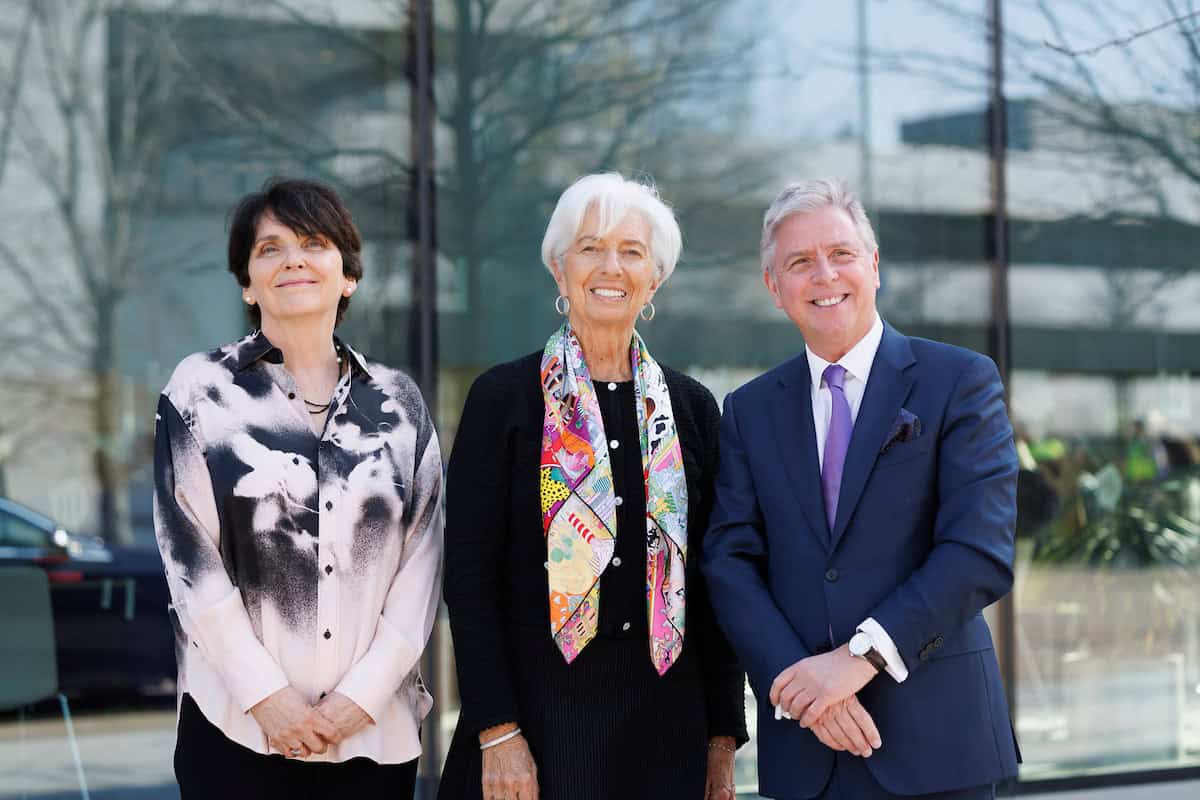
Pictured (from l-r): Orla Feely, President of UCD; Christine Lagarde, President of the European Central Bank and Ian Hyland, President of Ireland INC.
Globalisation
Seamus Hand, Managing Partner, KPMG Ireland, spoke about “the important and positive impact that globalisation can have on society”, doing so in “the name of our own Peter Sutherland,” who Hand noted was “a great statesman, a great European and a strong advocate for international trade”.
Hand noted that Lagarde’s receipt of the Sutherland leadership award was timely, “as we are clearly experiencing a very volatile moment in history.”
He continued: “Many of you are faced with unprecedented levels of uncertainty, uncertainty and unpredictability – generally not a friendly environment for business and economic development. But we should remember that there is always a way through, a path beyond the uncertainty if we are willing to look hard enough – and that is where real leadership plays its part in a number of ways.”
Hand stressed the importance of a measured response to such a volatile climate, using President Lagarde as an example of how to approach challenging times: “Carefully navigating the financial crisis in the IMF and more recently in her approach to monetary policy in the ECB, in both combining technical expertise with a deep understanding of human impact.”
Hand stressed that it is critical that Ireland continues to play a strong role in supporting and guiding the EU: “We are and will be much stronger together with leaders in Europe, like our own Minister but also like President Lagarde, encouraging unity and independence.”
He continued: “It is also important for Europe to challenge itself, to examine its competitiveness and to take bold actions to address its structural challenges, to break down barriers to unity, to foster innovation and deepen capital markets integration in order to restore its dynamism and boost economic growth. And lastly, we should remember that the current environment, volatile and unpredictable as it is, will also provide opportunities for the willing. Opportunities for transformation, for innovation and for collaboration.”
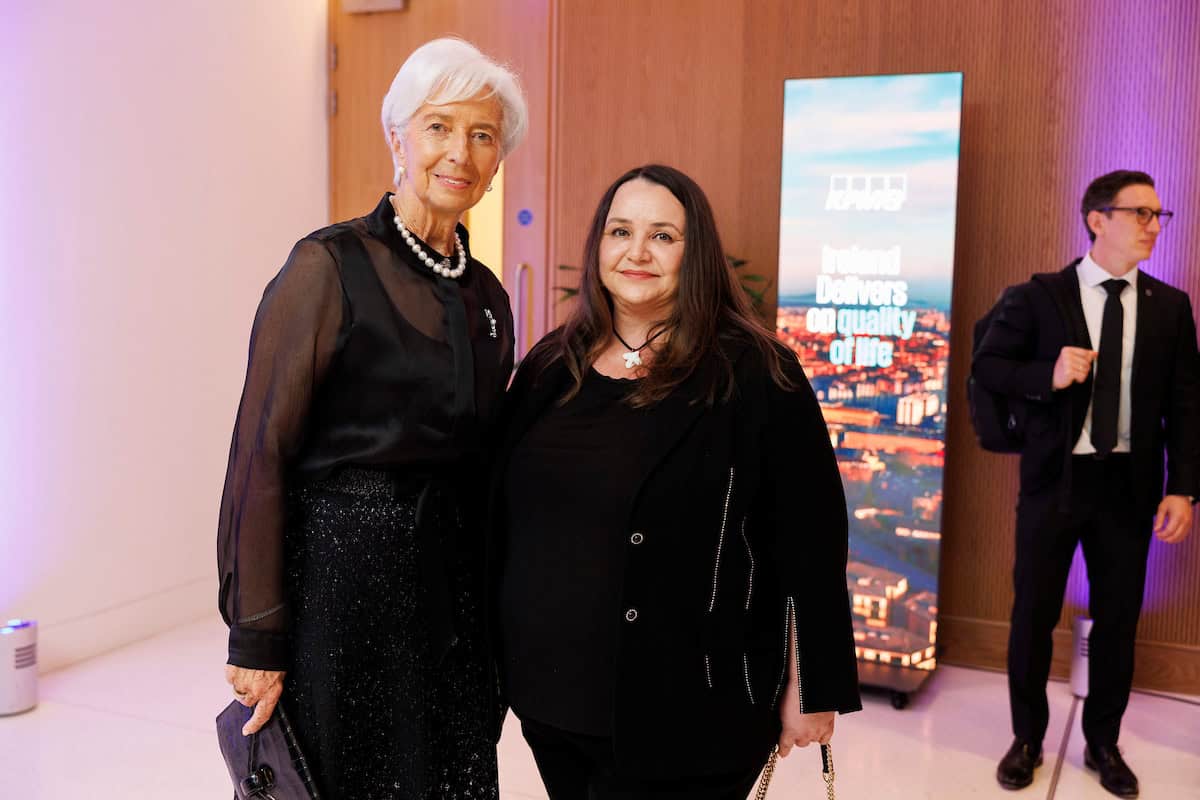
Pictured (from l-r): Christine Lagarde, President of the European Central Bank and Larysa Gerasko, Ukrainian Ambassador to Ireland.
“When Christine speaks, people listen”
Paschal Donohoe, Minister for Finance, presented the Sutherland Leadership award to Christine Lagarde.
“Christine is much too modest to boast of her achievements,” he said. “I have had the privilege of working closely with Christine for many years now, as Minister when she led the International Monetary Fund, in the Eurogroup meeting of Finance Ministers, which I am privileged to chair, and in G7 meetings, where we both represent Europe.
As President of the ECB, Donohoe said, every word Lagarde speaks “is parsed by financial markets”.
He continues: “Foreign exchange traders, bond and equity market analysts look for every nuance in her utterances. It is a high pressure role. But the wider point I am trying to make is, when Christine speaks, people listen. Traders, the public, her colleagues, Ministers and Leaders.”
Officials do not simply listen to Lagarde because of the leadership positions she has held, Donohoe continues. “They listen because of her poise, her perceptiveness, her ability to capture the essence of the issue we are discussing immediately and communicate it clearly, frankly but constructively. Her experience on the global stage is nearly unrivalled. As is her commitment to multilateralism.
“She has attended G7 meetings for 17 years. She has seen the highs and lows of global politics and economics and led on the world stage from the front, as Minister, as Managing Director of the IMF and now as President of the ECB.”
Christine Lagarde, says Donohoe, is someone “who understands their challenges, lives their shared values, and someone who brings people together to overcome adversity – Whether through the leadership role she played as French Finance Minister helping the Eurozone solve financial and sovereign debt crisis, whether through her leadership of the IMF helping the world come to terms with the aftermath (not least Ireland’s programme), whether as President of the European Central Bank, leading the fight against inflation after a pandemic, I don’t think there is someone more deserving of the Sutherland Award for Leadership than Christine Lagarde and it is a huge honour to present it to her.”
European moment
Christine Lagarde opened her speech by stating it was an honour to receive the Sutherland Leadership Award. “Go raibh maith agaibh,” she said.
“There are moments in history when things that were once set in stone become fluid,” she continued.
“Institutions, norms and alliances that seemed timeless can suddenly be remade. These moments typically come only once in a generation. Peter Sutherland faced such a juncture when the Cold War ended. The collapse of the Soviet Union could have ushered in a period of global instability and turmoil.
“But Peter demonstrated skilful leadership to leverage the defining geopolitical event of his time. As head of the General Agreement on Tariffs and Trade, he successfully led the world’s largest trade negotiation, involving over 120 countries, which ushered in an era of unprecedented global cooperation and prosperity.”
However, comparing our contemporary moment with Peter Sutherland’s era, Lagarde says, “the geopolitical landscape we face today has been turned upside down. We can see this inverted world playing out in different ways. After the Cold War, the global economy was generally one of openness, integration and certainty. Everyone benefited from a hegemon, the United States, that was committed to a multilateral, rules-based order. This allowed trade and investment to flourish.”
“But today we must contend with closure, fragmentation and uncertainty”, she said.
“Geopolitical rivalries are spurring protectionism and upending global supply chains. The international institutions that Peter helped to build are facing increasing challenges. And one index of trade policy uncertainty now stands at more than eight times its average value since 2021.
This landscape poses a serious challenge for Europe on two fronts.
“Economically, it risks compounding existing issues like sluggish productivity growth and weak competitiveness. Europe’s reliance on external trade – its trade-to-GDP ratio is about twice that of the United States – makes it vulnerable to trade headwinds. On top of this, pronounced uncertainty may hold back the investment necessary for Europe’s recovery.
Strategically, the new geopolitical environment could also heighten security vulnerabilities, says Lagarde.
“We can no longer fully count on the security arrangements that have stood in place since the Second World War. If a security vacuum should arise, it may encourage opportunism by hostile actors on Europe’s doorstep.
“Yet despite this challenging landscape, I see a tremendous opportunity for Europe. Just as in Peter’s time, the structures that once seemed permanent are now becoming fluid again. And just as he did, we can harness the momentum created by geopolitical events to drive positive change.
“So how can we – as Europeans – rise to the moment? We can do so by embracing a simple idea that, at first glance, seems contradictory, but which in an inverted world makes perfect sense: we must cooperate to compete. And in doing so, we must also leverage our competitive advantage.
“On the economic front, we need to work together to simplify and scale up our economy so that we can hold our own in a world dominated by economic giants. If we do so, we can attract talent and investment.
“That means integrating our capital markets, allowing Europe’s ample savings to fund our much-needed investments. And following the powerful example set by Peter during his time as European Commissioner in the 1980s, it means removing internal barriers that stand in the way of our Single Market, allowing our firms to scale more easily and compete more effectively.
“There is clear momentum on this front. The reports by Enrico Letta and Mario Draghi have opened the way. And with its Competitiveness Compass, the European Commission has put forward a concrete roadmap with milestones that should be urgently implemented.
“But we cannot stop halfway and we are pressed for time. As we scale up our economy, we need to scale up our decision-making to match it – and thereby stand tall and be heard.
“At a time when major economies are adopting cohesive strategic agendas – using tariffs, for example, to extract concessions on other strategic goals – Europe cannot afford to be disunited. If we cannot take decisions in a European way, then others will use that against us.
“To stand our ground, we need to be able to act as a single entity across several key areas. And that means we need to structurally change how we make decisions.
“We know what stands in our way: a historical tradition whereby a single veto can scupper the collective interest of 26 other countries. But given the geopolitical shift at hand, I am convinced that national and European interests have never been so aligned. In this inverted world, more qualified majority voting would therefore be inherently more democratic.
“I have no doubt that we can unleash a “European moment” – if leaders are willing to seize it.
“If it sounds like I am confident about Europe’s future, it is because I am. But I am in good company here tonight. A recent survey finds that of all the Member States, the Irish are the most optimistic about the EU’s future, and they are among the strongest supporters of the euro.
“This sense of optimism is perhaps rooted in Ireland’s extraordinary transformation in recent decades. And here I am reminded of the words of Oscar Wilde, who once wrote, ‘Success is a science; if you have the conditions, you get the result’.
“Ireland put those conditions in place during the most challenging of times, and has reaped the rewards. It is now incumbent on Europe to do the same. Thank you.”
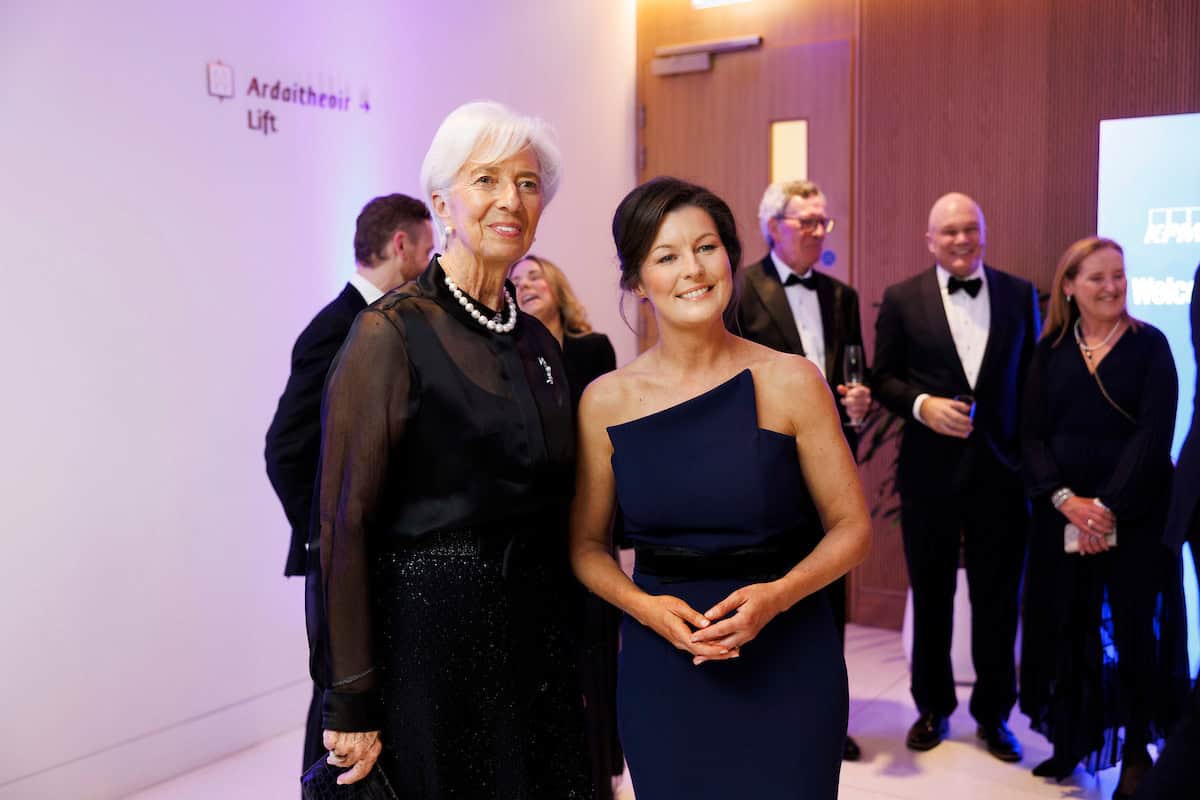
Pictured: Christine Lagarde, President of the European Central Bank and Sarah Freeman, Managing Editor of Business & Finance.
READ MORE:
